|
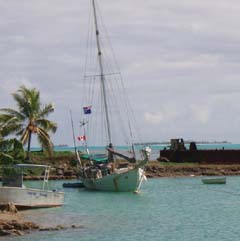 Umi
was a wooden sloop rigged sailboat about 40 feet long with a displacement
in the 10 ton range. Umi with Dean and Trish aboard, set out from Vancouver
about five years ago. Sailing Umi, Dean and Trish, traveled Mexico,
Central America and South America. The picture on the left shows UMI at anchor in the very shallow harbor at Aitutaki in the Cook Islands. Umi
was a wooden sloop rigged sailboat about 40 feet long with a displacement
in the 10 ton range. Umi with Dean and Trish aboard, set out from Vancouver
about five years ago. Sailing Umi, Dean and Trish, traveled Mexico,
Central America and South America. The picture on the left shows UMI at anchor in the very shallow harbor at Aitutaki in the Cook Islands.
In Ecuador, South America, Dean spent
countless hours drying out the Umi and replacing timbers and planking to
prepare for the passage across the Pacific. Dean is a carpenter.
This year they set out for the south Pacific via the Galapagos. Umi’s
engine seized up after they departed the Galapagos.
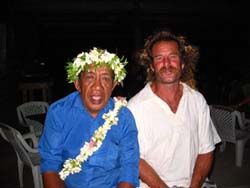 With
the trade winds and current sweeping westerly, returning for repairs is
not viable on two accounts. Going against the prevailing winds and
current can be very tough and Umi was not good at sailing to windward.
Secondly, the Galapagos is not a place to have major repairs done - lack of mechanics and little in the way of spare parts.
So, Dean and Trish continued onwards to French Polynesia with plans to overhaul in New Zealand. With
the trade winds and current sweeping westerly, returning for repairs is
not viable on two accounts. Going against the prevailing winds and
current can be very tough and Umi was not good at sailing to windward.
Secondly, the Galapagos is not a place to have major repairs done - lack of mechanics and little in the way of spare parts.
So, Dean and Trish continued onwards to French Polynesia with plans to overhaul in New Zealand.
Sharon and I first met Dean and Trish
in Tahiti. We went our separate ways and were surprised to find them a
month later stern tied in the harbor at Aitutaki. Dean is at the right in the
picture on the right. We got to know
Dean and Trish
as we visited the various dance venues
around Aitutaki. We were anchored a few tens of feet apart so we were
neighbors for a week or so.
I helped Dean retrieve his anchor that
had fouled at the entrance to the pass at Aitutaki. Dean sold me some
diesel at bargain basement prices – he had bought it in Ecuador at $1.15
US a gallon and had no need for it. We were sailors together at a
remote south Pacific island – and we both came from the Vancouver area.
Instant, camaraderie.
I learned a little about Dean’s
indomitable spirit in Aitutaki. He told me how he had broken ribs, his
back and both legs in a moto-cross accident. The doctors said he would
never walk again. But he did. And he sailed half way around the
world. His scarred body was a testament to rough treatment it received
in his youth. You could not help but admire his boldness in continuing to cross the ocean without an engine - like in days of old - or like some of hard core sailing icons of today.
We left Umi – Dean and Trish – in
Aitutaki. We were bound for Palmerston Island. Before we left we
promised to meet Dean and Trish further west – either Palmerston, Niue
or Tonga. But because they had no engine they were being very
conservative on their destinations and unless conditions were perfect,
they would not stop.
Three
weeks later we were in a store in Nuie, when I thought I heard a local
talking about a wrecked yacht. The Niueans speak much like the Kiwi’s
and it is sometimes difficult to understand their dialect. They also
lapse in and out of Moari, so it can be confusing. So I asked them.
They
didn’t know any more than a yacht had gone up on the reef on the east
side of the island. We had been over on the east side of the island the
day before and the terrain was rough and the wind had been blowing hard
– 20-30 knots from the east for days. The big wind blowing for days
built up big booming waves that threw spray hundreds of feet high up the steep
cliffs lining the eastern shore. It seemed impossible to think of
anyone surviving those waves.
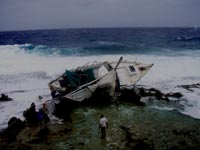 A few hours later, we ran into Trish
in the coffee shop/Internet café. She was bruised and beat up and was a
emotional wreck. Sharon took her under her wing along with the locals
who gave Dean and Trish a room to stay. Although they had just wrecked
that morning, Dean had returned to the wreck with the local police to
access the situation. A few hours later, we ran into Trish
in the coffee shop/Internet café. She was bruised and beat up and was a
emotional wreck. Sharon took her under her wing along with the locals
who gave Dean and Trish a room to stay. Although they had just wrecked
that morning, Dean had returned to the wreck with the local police to
access the situation.
Over the next few days we pieced
together the sad story. Dean and Trish had been hand steering in heavy
seas condition for four or five days. With just the two of them, they
would have been exhausted. Dean was navigating toward a spot two miles
off the south east corner of Nuie. He was navigating with GPS toward a
way point from a cruising guide. Umi had no radar or electronic
charts.
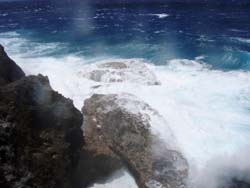 It was dark – the pre-dawn hours –
cloudy and windy. There are no lights or navigational aides on the east
side of Nuie. After they reached the south east corner, they planned
to turn north and sail into the lee of the island. They planned to
arrive just after dawn when visual confirmation of Umi’s position could
be established. It was dark – the pre-dawn hours –
cloudy and windy. There are no lights or navigational aides on the east
side of Nuie. After they reached the south east corner, they planned
to turn north and sail into the lee of the island. They planned to
arrive just after dawn when visual confirmation of Umi’s position could
be established.
Trish was on the helm, Dean was
awake, but not on deck. Trish heard the waves crashing and screamed
“SURF”. It was to late. It would be tough for any boat to pull away
from the shore at that point.
Umi was about 7 miles north and 2
miles west of the intended position when they hit the reef. Umi hit the reef at a forgiving point. Further south or north conditions were such that the boat would have been torn to bits in a few hours. Umi had found a not unkindly ledge. Successive
waves lifted her further and further up the reef. When the boat
stopped moving it was low tied and the reef was exposed. That was when
Dean and Trish made their escape.
Grabbing a few possessions they
scrambled over the reef to the extremely rugged rocks that make up the
cliffs. Up and over the cliffs, cutting their feet and hands on the
rocks, they climbed higher and higher. Trish had not been able to find he shoes – Dean
wrapped her feet in a purse and a scarf. Clearing the rocks they were
faced with dense jungle. They forced their way through until they found
a path. Following the path they came our on a gravel road where they
sat down to rest.
An hour or so later, some Indian
farmers, found them and brought them to their home and fed them a hot
meal. The farmers got in touch with the police who brought Dean and
Trish into the town of Alofi. Dean went back to the wreck and Trish
stayed.
That night there happened to be a
cruiser pot luck dinner scheduled. That dinner brought together all of the visiting sailors and many boaters from the local yacht club. The normal enthusiasm of the sailors was
muted in light of Umi’s fate. Dean had made a navigational error and
but for the grace of God, anyone of us were capable of making a similar
mistake.
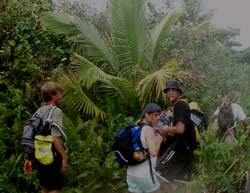 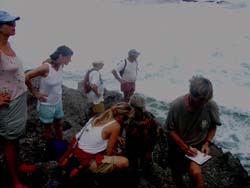 We
organized a salvage mission for the next day. Just before low tide the
salvage team, led by Dean, mustered at the Coffee/Internet shop. The local car rental agency donated
trucks. 19 men and women, some cruisers and some locals returned to the
wreck. We
organized a salvage mission for the next day. Just before low tide the
salvage team, led by Dean, mustered at the Coffee/Internet shop. The local car rental agency donated
trucks. 19 men and women, some cruisers and some locals returned to the
wreck.
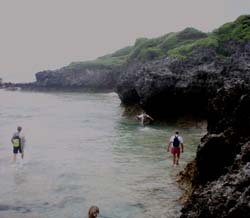 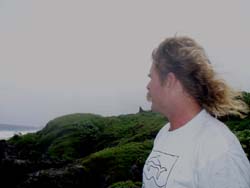 It
was a hard hike to the wreck. First several miles on a jungle
path. Then a very rough climb over sharp volcanic and coral rocks.
The picture at the left shows the last 1/2 mile to the wreck. Some
of our group continued south over the sharp rocks - slow and treacherous
but you did not get wet. Others like the group shown in the
picture at the left, walked over the reef at low tide. The reef
walkers had to be very careful of the surf. Large waves would come
rolling in and you had to run up the cliff to avoid being lifted you off
your feet and sucked out to sea. Fun huh? It
was a hard hike to the wreck. First several miles on a jungle
path. Then a very rough climb over sharp volcanic and coral rocks.
The picture at the left shows the last 1/2 mile to the wreck. Some
of our group continued south over the sharp rocks - slow and treacherous
but you did not get wet. Others like the group shown in the
picture at the left, walked over the reef at low tide. The reef
walkers had to be very careful of the surf. Large waves would come
rolling in and you had to run up the cliff to avoid being lifted you off
your feet and sucked out to sea. Fun huh?
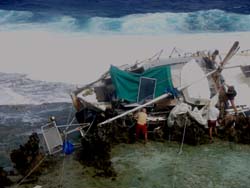 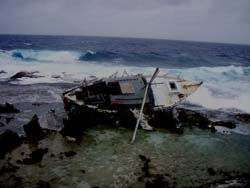 Once
at the wreck we divided into two crews, one at the wreck removing gear
as fast as they could. Another group worked above the high water,
on top of the cliff to move and stow the gear. Once
at the wreck we divided into two crews, one at the wreck removing gear
as fast as they could. Another group worked above the high water,
on top of the cliff to move and stow the gear.
All the major equipment was gathered
up and moved above the high water line. The salvage team was silent and reflective as
they retrieved a perfectly usable, but un-installed wind vane. A wind
vane is a self steering mechanism. More reflection as a brand new SSB radio,
still in boxes was carried up the cliff. Umi had uninstalled gear on
board that might have reduced the probability of navigational errors.
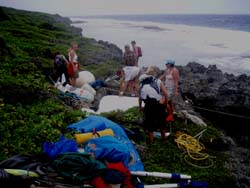 We departed Nuie two days later, after
offering Dean and Trish passage to New Zealand. Trish was not getting
on another boat and Dean felt he would need a few weeks to finish the
salvage operation. We departed Nuie two days later, after
offering Dean and Trish passage to New Zealand. Trish was not getting
on another boat and Dean felt he would need a few weeks to finish the
salvage operation.
The story has a happy ending. We met Dean and Trish
a few months later in New
Zealand. They were looking for another boat. In early 2007,
I heard via the cruiser grapevine that they now have a new boat and are
on the water again. As a sailor, one can not help but admire the courage
and resilience of Dean and Trish.
Click
here
for a slide show off all the people who helped with the first days
salvage operation.
|



